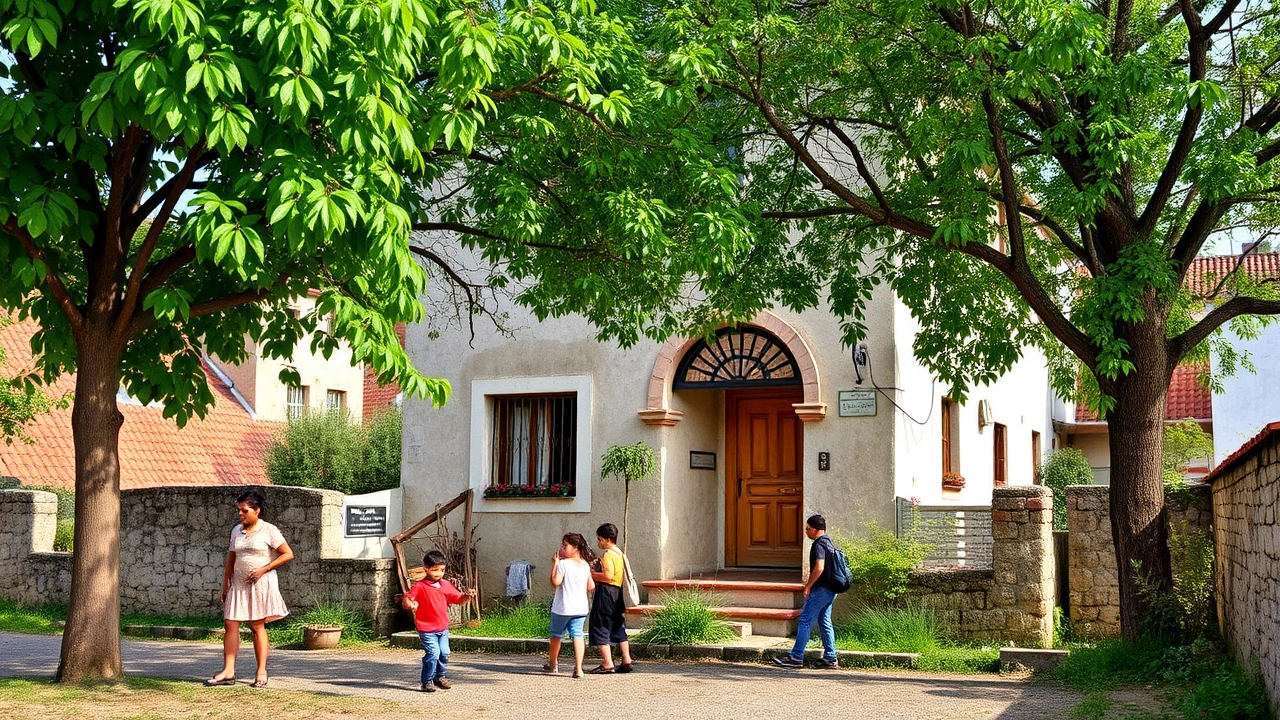
 Published on and written by Cyril Jarnias
Published on and written by Cyril Jarnias
The Bali real estate market attracts numerous investors with its idyllic landscapes and growing tourist appeal. However, accessing this expanding market can prove complex for international buyers.
This is where crowdfunding emerges as an innovative solution, enabling funds to be raised from a broad network of investors to bring promising real estate projects to fruition.
This collaborative investment method offers the opportunity to diversify your portfolio, while bypassing some of the traditional barriers of real estate financing.
Let’s explore how crowdfunding is transforming purchasing dynamics in Bali, thus offering a gateway to unprecedented opportunities in this tropical paradise.
Introduction to Real Estate Crowdfunding in Bali
The emergence of real estate crowdfunding in Bali occurs in a context where the market is experiencing rapid growth, driven by the tourism boom and consistent interest from foreign investors. Traditionally, financing options for acquiring or developing property were limited, especially for non-residents, due to the difficulty of obtaining loans from Indonesian banks or restrictions on land ownership. To circumvent these obstacles and diversify capital sources, real estate crowdfunding began developing as an innovative alternative several years ago.
Historical Aspects and Emergence
- The use of real estate crowdfunding is relatively recent in Bali; it accelerated with the digitization of financial services and the search for flexible solutions by both local and international project developers.
- Initially marginal, this method gained visibility through the success of operations conducted on specialized platforms allowing individuals to collectively invest in various real estate projects.
Potential Economic Impact
- Crowdfunding energizes the local market by facilitating access to capital for entrepreneurs who couldn’t secure traditional financing.
- It also promotes job creation through hotel or residential development and indirectly contributes to supporting the island’s major tourism activity.
Types of Projects Typically Funded
| Project Type | Description |
|---|---|
| Renovation/Modernization | Acquisition followed by complete renovation (e.g., aging villas transformed into high-end rentals) |
| New Development | Construction from scratch (e.g., residential complexes/villas/apartments) |
| Hospitality/Tourism | Creation or extension of hotels/boutique hotels near tourist sites |
Concrete examples:
- Collective project to renovate several villas in Seminyak to turn them into premium rentals with high rental yields.
- Crowdfunding for the development of a high-end residential complex in Canggu involving local and international investors.
Advantages for Investors
- Easier access to the Balinese market without mobilizing significant capital alone
- Geographic diversification of the portfolio
- Potentially attractive returns thanks to the tourism dynamic
Potential Disadvantages
- High risk linked to local economic fluctuations and complex legislation surrounding land ownership (forbidden for foreigners)
- Lower liquidity compared to traditional markets
- Absolute necessity for good local legal knowledge
Key Players (Platforms)
| Platform | Main Characteristics |
|---|---|
| Epatrimony | Regularly offers hotel/real estate projects accessible from €1,000 |
| Emerging Local Platforms | Often oriented towards co-investment between expatriates/Indonesian investors |
Regulations Governing Real Estate Crowdfunding in Indonesia
The legal framework remains restrictive regarding direct ownership by foreigners: only Indonesian citizens can own land. Investments are therefore often structured as:
- Temporary rights (“Hak Pakai”);
- Locally controlled companies (“PT PMA”), allowing certain legal arrangements;
- Complex commercial contracts supervised by specialized lawyers.
Indonesian authorities also closely monitor these practices to ensure the sector remains transparent—any platform must comply with strict regulations on the lawful origin of invested funds and protection against money laundering.
Key Takeaway
Real estate crowdfunding today offers an innovative alternative but requires legal rigor, careful selection of the project/platform, and prudent management of regulatory risk. Notable successes illustrate its effectiveness as a local economic catalyst while significantly expanding opportunities for global investors.
Good to Know:
Real estate crowdfunding in Bali, which took off in the early 2010s, quickly established itself as an innovative alternative to traditional financing, attracting both small and large investors. Initially used to support modest-sized projects, it now extends to more ambitious developments, such as hotel complexes and luxury villas, due to its significant economic potential for energizing the local market. Platforms like Investree and Modalku play a central role in this sector, aligning with current regulations to secure transactions and protect investor interests. Although advantageous for diversifying investments and accessing attractive returns, real estate crowdfunding presents risks, particularly in terms of liquidity and legal protocol, a crucial aspect for foreign investors to consider. A notable success example is the rehabilitation of a former tourist site transformed into a commercial complex, funded by various contributions, well illustrating the effectiveness of this financing method in Bali.
Advantages of Participatory Investment in Bali, Indonesia
Real estate crowdfunding in Bali provides access to projects once reserved for investors with substantial capital. Through resource pooling, it now only requires a modest initial contribution to collectively participate in the acquisition or financing of a property on the island. This mechanism thus democratizes access to the Balinese market, opening the door to small investors and diversifying participant profiles.
Economic and Financial Advantages of Real Estate Crowdfunding:
- Portfolio diversification: ability to spread investments across multiple real estate projects rather than concentrating risk on a single asset.
- Potential increased profitability: the Balinese rental market generally shows attractive gross returns, between 6% and 12% per year depending on the area and property type.
- Risk reduction through pooling: by sharing invested funds with other participants, each limits their individual exposure while collectively benefiting from the profits generated by the project.
| Advantage | Description |
|---|---|
| Accessibility | Investment possible from just a few hundred or thousand euros |
| Pooling | Risk sharing among all investors |
| Diversification | Simultaneous access to multiple real estate projects |
| Return Potential | Attractive rental returns supported by local tourism dynamism |
Participatory investment also plays a driving role in local economic development. By directly financing real estate projects (villas, tourist residences, commercial properties), it enables:
- Support for local developers who can thus realize their ambitions without depending exclusively on large private or bank capital.
- Direct and indirect job creation in construction, hotel management, and ancillary services related to tourism.
- Continuous improvement of tourist and urban infrastructure through new investments.
For foreign residents traditionally facing Indonesian restrictions regarding direct access to land ownership (“Hak Milik” reserved for nationals), these mechanisms offer various adapted solutions:
- Right of use “Hak Pakai” (up to 30 years renewable)
- Long-term lease (“Leasehold”) up to 80 years
- Possible creation of a local company (PT PMA) allowing certain acquisitions
Thus, even as a non-Indonesian, it remains possible—through these legal structures—to secure financial participation in a collective real estate project.
Concrete examples already testify to the success encountered by this participatory model. Several high-end villas have been funded via crowdfunding in recent years; some groups have been able to generate a net return higher than that offered by a classic isolated acquisition thanks to intelligent sharing of invested capital and professional on-site management. Testimonials also highlight the importance for each beginner investor to be well-informed about the local legal process to secure their commitment.
Finally, several specialized platforms now facilitate this international access:
| Platform | Specificity |
|---|---|
| BaliCrowd | Selected projects with legal audits |
| RealtyMogul Asia | International opening for small investors |
| Epatrimony | Dedicated French-speaking support |
These platforms often offer a multilingual interface adapted to foreign investors as well as personalized support to navigate all local administrative steps: thorough due diligence, clear contracting (in English/French/Indonesian), transparency on future distribution of rental profits or from collective resale.
In Summary
Real estate crowdfunding today constitutes a powerful lever for effectively investing in the dynamic Balinese real estate market while limiting individual risks and traditional regulatory barriers. It offers increased financial accessibility, optimal diversification, and lasting positive impacts for both investors and the local island economy.
Good to Know:
Real estate crowdfunding allows investors to access real estate opportunities in Bali without requiring heavy initial investments, paving the way for portfolio diversification and potentially increased profitability while reducing risks through pooling. Specialized platforms facilitate this access, even for foreign residents, by circumventing traditional land restrictions for non-Indonesians. This type of investment supports local economic development by financing real estate projects that stimulate tourism and improve infrastructure. Success stories such as those of participatory villas in Ubud or hotel complexes in Seminyak illustrate the tangible advantages of crowdfunding in Bali.
How to Choose Reliable Platforms for Real Estate Crowdfunding in Bali
To assess the reliability of a real estate crowdfunding platform in Bali, several essential criteria must be considered to secure your investment and maximize your chances of success.
Platform Evaluation Criteria
- Local Regulation and Legal Compliance:
- Verify that the platform complies with Indonesian laws on foreign investment, particularly the prohibition for non-residents to own property outright. Common structures include Hak Pakai (right of use), Hak Sewa (long-term lease), or the creation of a local company (PT PMA) allowing certain forms of holding.
- Ensure the platform has all necessary licenses and uses experienced local lawyers to guarantee full compliance with the regulatory framework.
- Certifications and Accreditations:
- Prefer platforms with recognized certifications in the real estate crowdfunding sector.
- Examine if they are affiliated with professional associations or subject to regular external audits.
Analysis of History and Performance
- Operational History:
- Check how long the platform has existed, its total invested volume, and its specific presence in the Balinese market.
- Success Rate of Previous Projects:
- Evaluate the total number of funded projects, their actual completion rate, and average timelines observed for each project.
- Investor Testimonials and Reviews:
- Carefully read customer feedback on various specialized forums or independent sites to identify positive/negative recurring themes regarding management, communication, or returns obtained.
Research on Financial Transparency
- Regular publication of detailed financial reports per project
- Easy access to legal documents related to operations
- Clear explanation of the business model and calculation of expected returns
Tip: prefer a platform that openly displays its fees, applicable tax policy (including local taxes like capital gains tax on real estate), and its accounting management.
Risk Management
| Element | To Verify |
|---|---|
| Diversification | Number/varied type of projects offered |
| Due Diligence | Rigorous process before real estate selection |
| Insurance | Possible existence of insurance against defaults |
| Rental Management | Clear strategy in case of unforeseen events |
It is also recommended that an investor consult a local expert to validate any proposed structure before making a significant financial commitment.
Understanding the Local Balinese Real Estate Market
- Know the recent evolution of prices per square meter in different tourist/urban areas.
- Understand how tourist seasonality influences occupancy/rental yield.
- Take into account possible instability linked to regulatory changes specific to the Indonesian context.
The complex legal context often requires structuring via PT PMA or limited rights rather than a classic acquisition. Therefore, being assisted by a local professional is essential.
Key Takeaway:
Financial security depends as much on the intrinsic seriousness of each platform as your own understanding of the Balinese market—always cross-reference local official sources, independent testimonials, and regular audits before any significant investment.
Good to Know:
To choose reliable real estate crowdfunding platforms in Bali, it is crucial to assess their compliance with local regulations and ensure they possess the necessary certifications. Examine the platform’s history and success rates of previous projects to evaluate their reliability. Testimonials from other investors are also valuable indicators of trust. Ensure the platform demonstrates financial transparency and has robust strategies for risk management. Understanding the local real estate market is also essential, as it directly impacts the security and potential returns of your investments. Investigating these elements will help mitigate risks and optimize your chances of success.
Disclaimer: The information provided on this website is for informational purposes only and does not constitute financial, legal, or professional advice. We encourage you to consult qualified experts before making any investment, real estate, or expatriation decisions. Although we strive to maintain up-to-date and accurate information, we do not guarantee the completeness, accuracy, or timeliness of the proposed content. As investment and expatriation involve risks, we disclaim any liability for potential losses or damages arising from the use of this site. Your use of this site confirms your acceptance of these terms and your understanding of the associated risks.















































